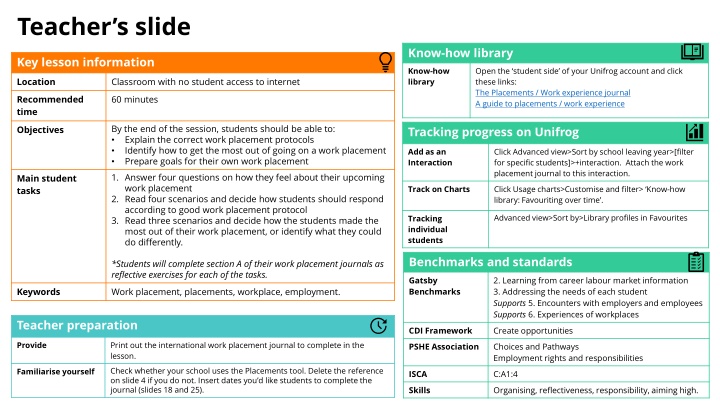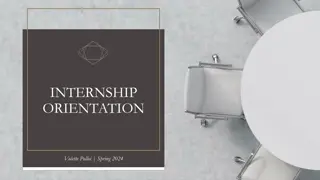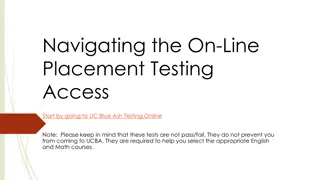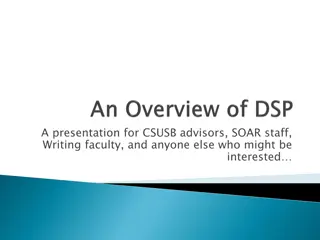Mastering Work Placement Protocols
Equip students with essential knowledge and skills to excel in work placements through interactive sessions covering protocols, goal setting, scenario analysis, and reflective exercises. Enhance their understanding of work environments, professional relationships, and maximizing placement opportunities. Utilize Unifrog for tracking progress, supporting individual student needs, and fostering career readiness.
Download Presentation

Please find below an Image/Link to download the presentation.
The content on the website is provided AS IS for your information and personal use only. It may not be sold, licensed, or shared on other websites without obtaining consent from the author.If you encounter any issues during the download, it is possible that the publisher has removed the file from their server.
You are allowed to download the files provided on this website for personal or commercial use, subject to the condition that they are used lawfully. All files are the property of their respective owners.
The content on the website is provided AS IS for your information and personal use only. It may not be sold, licensed, or shared on other websites without obtaining consent from the author.
E N D
Presentation Transcript
Teachers slide Know-how library Key lesson information Know-how library Open the student side of your Unifrog account and click these links: The Placements / Work experience journal A guide to placements / work experience Location Classroom with no student access to internet Recommended time 60 minutes By the end of the session, students should be able to: Explain the correct work placement protocols Identify how to get the most out of going on a work placement Prepare goals for their own work placement 1. Answer four questions on how they feel about their upcoming work placement 2. Read four scenarios and decide how students should respond according to good work placement protocol 3. Read three scenarios and decide how the students made the most out of their work placement, or identify what they could do differently. Objectives Tracking progress on Unifrog Add as an Interaction Click Advanced view>Sort by school leaving year>[filter for specific students]>+interaction. Attach the work placement journal to this interaction. Main student tasks Track on Charts Click Usage charts>Customise and filter> Know-how library: Favouriting over time . Advanced view>Sort by>Library profiles in Favourites Tracking individual students Benchmarks and standards *Students will complete section A of their work placement journals as reflective exercises for each of the tasks. Gatsby Benchmarks 2. Learning from career labour market information 3. Addressing the needs of each student Supports 5. Encounters with employers and employees Supports 6. Experiences of workplaces Keywords Work placement, placements, workplace, employment. Teacher preparation CDI Framework Create opportunities Provide Print out the international work placement journal to complete in the lesson. PSHE Association Choices and Pathways Employment rights and responsibilities Check whether your school uses the Placements tool. Delete the reference on slide 4 if you do not. Insert dates you d like students to complete the journal (slides 18 and 25). Familiarise yourself ISCA C:A1:4 Skills Organising, reflectiveness, responsibility, aiming high.
Preparing to go on a work placement
Starter (5 mins) It s normal to have mixed feelings about going on a work placement. The key to succeeding on a placement is to be prepared. Complete the tasks below: If you feel comfortable, share your answers with those sitting near you. 1. Write at least onething you re looking forward to about your work placement 3. Write at least one way your work placement will be different from school 2. Write at least onething you re worried about your work placement 4. Write at least one professional relationship you ll develop on work placement
Work placement admin (5 mins) Today, you ll start completing your work placement journal. Top tip: Have you completed your Student initial form on the Unifrog Placements tool? If not, complete this after the lesson. 1. Complete section 1 of your placement journal called Work placement profile now. 2. Use the internet to search for answers you don t know.
Work placement protocol: what should you do? (15 mins) Read the scenario and answer what you think the student should do: What should Tim do? Scenario 1 Tim has a great day on his first day of placement. He can t wait to go back. He wakes up the next day and is sick. He doesn t feel well enough to go to work but is too scared to tell them he isn t well enough. He s worried that they ll think he s faking. a) Go to work unwell - the employer will think he s dedicated b) Get his mum to call school - they'll tell the employer c) Just don't go - it's not like he's a "proper" employee d) Email them and explain that he's too ill to come to work e) Something else
Work placement protocol: what should you do? Read the scenario and answer what you think the student should do: What should Tim do? Scenario 1 Tim has a great day on his first day of placement. He can t wait to go back. He wakes up the next day and is sick. He doesn t feel well enough to go to work but is too scared to tell them he isn t well enough. He s worried that they ll think he s faking. a) Go to work unwell - the employer will think he s dedicated b) Get his mum to call school - they'll tell the employer c) Just don't go - it's not like he's a "proper" employee d) Email them and explain that he's too ill to come to work e) Something else He should personally callthe employer and reporthis absence to school in the usual way.
Work placement protocol: what should you do? Read the scenario and answer what you think the student should do: What should Danni do? Scenario 2 It s Danni s first day on a work placement at her local council office. She got up late and missed her train. She s going to be 15-30 minutes late. She doesn t want to go anyway and thinks about going home and pretending she s sick. Write the positive and negative consequences of each option. a) Go home as she's already late. She can pretend to be unwell so she doesn t look bad. b) Arrive whenever she gets there and hope no one notices she's late; perhaps she'll get away with it. c) Call or text her work placement to apologise and let them know what time she'll arrive.
Work placement protocol: what should you do? Read the scenario and answer what you think the student should do: What should Danni do? Scenario 2 It s Danni s first day on a work placement at her local council office. She got up late and missed her train. She s going to be 15-30 minutes late. She doesn t want to go anyway and thinks about going home and pretending she s sick. Write the positive and negative consequences of each option. a) Go home as she's already late. She can pretend to be unwell so she doesn t look bad. Positive: She ll avoid the embarrassment of admitting that she made a mistake. Negative: She ll miss out on an opportunity to learn how to take accountability for a mistake. She ll miss out on a full day of experience of the workplace. She might feel guilty about the lie.
Work placement protocol: what should you do? Read the scenario and answer what you think the student should do: What should Danni do? Scenario 2 It s Danni s first day on a work placement at her local council office. She got up late and missed her train. She s going to be 15-30 minutes late. She doesn t want to go anyway and thinks about going home and pretending she s sick. Write the positive and negative consequences of each option. b) Arrive whenever she gets there and hope no one notices she's late; perhaps she'll get away with it. Positive: If no-one notices she s late, she might avoid the embarrassment of admitting she made a mistake. Negative: It s likely that people will notice her lateness. Lateness with no prior explanation or apology will be seen as highly unprofessional this will damage her reputation. She ll miss out on the experience of apologising for a mistake.
Work placement protocol: what should you do? Read the scenario and answer what you think the student should do: What should Danni do? Scenario 2 It s Danni s first day on a work placement at her local council office. She got up late and missed her train. She s going to be 15-30 minutes late. She doesn t want to go anyway and thinks about going home and pretending she s sick. Write the positive and negative consequences of each option. c) Call or text her work placement to apologise and let them know what time she'll arrive. Positive: Her placement will appreciate her honesty and maturity. She ll gain experience of having awkward conversations and taking accountability for her mistakes. Negative: She might have to have an uncomfortable conversation or feel awkward but this is valuable experience.
Work placement protocol: what should you do? Read the scenario and answer what you think the student should do: What should Cherelle do? Scenario 3 Cherelle has been on placement for three days and was told she isn t allowed to use her phone. Her supervisor called her into the office and said another colleague saw her taking selfies at the desk. He s worried there may be confidential information on the screen in the background of her photo. a) Explain that Snapchats disappear so there s not been a breach of data protection. Reassure him that they were just selfies - it s not like she posted the company accounts online. b) Deny using her phone and say the colleague must have been mistaken. There's no proof so she can't get into trouble. c) Refuse to go back to the placement the next day as it's obvious everyone hates her and doesn't want her there. d) Own up to using her phone and apologise.
Work placement protocol: what should you do? Read the scenario and answer what you think the student should do: What should Cherelle do? Scenario 3 Cherelle has been on placement for three days and was told she isn t allowed to use her phone. Her supervisor called her into the office and said another colleague saw her taking selfies at the desk. He s worried there may be confidential information on the screen in the background of her photo. a) Explain that Snapchats disappear so there s not been a breach of data protection. Reassure him that they were just selfies - it s not like she posted the company accounts online. b) Deny using her phone and say the colleague must have been mistaken. There's no proof so she can't get into trouble. c) Refuse to go back to the placement the next day as it's obvious everyone hates her and doesn't want her there. d) Own up to using her phone and apologise.
Work placement protocol: what should you do? Read the scenario and answer what you think the student should do: What should Sarah do? Scenario 4 Sarah is on day three of her placement at a bank. One of her colleagues shows Sarah that she can access people s private information and asks if Sarah would like to search for someone she knows; she can see how much money they have in their account! a) Look up the information it ll be fun to find out how much money they have! b) Say no thank you. Later, report it to the manager and her school. c) Tell the colleague that is wrong and that she s going to report her. Her behaviour is incredibly unprofessional.
Work placement protocol: what should you do? Read the scenario and answer what you think the student should do: What should Sarah do? Scenario 4 Sarah is on day three of her placement at a bank. One of her colleagues shows Sarah that she can access people s private information and asks if Sarah would like to search for someone she knows; she can see how much money they have in their account! a) Look up the information it ll be fun to find out how much money they have! b) Say no thank you. Later, report it to the manager and her school c) Tell the colleague that is wrong and that she s going to report her. Her behaviour is incredibly unprofessional.
Work placement protocol: what should you do? Read the scenario and answer what you think the student should do: What should Sarah do? Scenario 4 Sarah is on day three of her placement at a bank. One of her colleagues shows Sarah that she can access people s private information and asks if Sarah would like to search for someone she knows; she can see how much money they have in their account! b) Say no thank you and report it to the manager and her school Write down: Why shouldn t Sarah confront her colleague? How is Sarah s colleague being a bad role model? What do you think a good leader would do if Sarah was honest and told them about what happened?
Work placement protocol: what should you do? Why shouldn t Sarah confront her colleague? Sarah should not put herself in a risky position by threatening the colleague who is breaking the rules. Saying no thank you and reporting the behaviour at a quiet time is the safest option. How is Sarah s colleague being a bad role model? Sarah s colleague is breaking customer confidentiality and leading Sarah into breaking the rules of the workplace. What do you think a good leader would do if Sarah was honest and told them about what happened? A good leader would be thankful and impressed with Sarah s honesty. A good leader would discreetly address the issue without putting Sarah in a difficult situation.
Work placement protocol: what should you do? Complete sections 2 and 3 of your work placement journal called Protocols and Health and Safety. Remember: You must inform your employer of any medical conditions or health issues you may have, especially if they could affect your ability to undertake certain tasks.
Making the most of your work placement (15 mins) To make the most out of work placement, you should: 1. Research the company: learn as much as you can beforehand. 2. Arrive on time: let them know if you ll be late or are unwell. 3. Follow the rules: such as health and safety, working hours, social media use. 4. Listen: and absorb as much information as you can! 5. Ask questions: there is no such thing as a silly question. 6. Complete your work placement journal:submit it by INSERT DATE. Read the following three scenarios and use these six tips to help you answer the questions.
Making the most of your work placement Scenario 1: Ahmed is working at his local mail delivery centre. He wants to be a car mechanic and thinks this is boring. He turns up late and has been caught sitting on his phone at the back of the store. On his last day, his work placement manager asks if he has any questions or needs any help with his work placement journal. He says no and asks to leave early. Ahmed thought the whole week was pointless. Write down at least two ways Ahmed could have engaged more with his work placement. Use the icons as clues.
Making the most of your work placement Scenario 1: Ahmed is working at his local mail delivery centre. He wants to be a car mechanic and thinks this is boring. He turns up late and has been caught sitting on his phone at the back of the store. On his last day, his work placement manager asks if he has any questions or needs any help with his work placement journal. He says no and asks to leave early. Ahmed thought the whole week was pointless. Write at least one thing Ahmed has missed out on by not engaging with his work placement. Good references Developing transferrable skills Clear understanding on why some work environments aren t for him
Making the most of your work placement Scenario 2: Polly is working at her old school. She researches what s changed at the school. On her first day, Polly arrives 10 mins early. She keeps her phone in her bag and doesn t get it out during class. Polly receives an induction and listens intently. During the week, Polly keeps a list of questions and goes through them in her daily catch-ups with her supervisor. Polly asks if they could spend time completing her work placement journal. Polly leaves feeling confident about a career in teaching. She records her skills on Unifrog. Her supervisor asks if she d like to volunteer with their summer school to gain more experience! Write down at least two ways Polly engaged with her work placement. Use the icons as clues.
Making the most of your work placement Scenario 2: Polly is working at her old school. She researches what s changed at the school. On her first day, Polly arrives 10 mins early. She keeps her phone in her bag and doesn t get it out during class. Polly receives an induction and listens intently. During the week, Polly keeps a list of questions and goes through them in her daily catch-ups with her supervisor. Polly asks if they could spend time completing her work placement journal. Polly leaves feeling confident about a career in teaching. She records her skills on Unifrog. Her supervisor asks if she d like to volunteer with their summer school to gain more experience! Write down at least one benefit Polly gained from engaging with her work placement. Developed her skills Increased confidence about her future Offered an additional opportunity to future develop her skills
Making the most of your work placement Scenario 3: Nathan secured a remote work placement for an HR department; he was sent everything he needed via post. Beforehand, he researched job roles within HR on the Unifrog Careers library and wrote down key skills and questions. His supervisor says that he is impressed with how he completed all tasks to a high level, was friendly on Zoom calls and asked lots of good questions. Nathan reflected in his journal that he found the placement quite boring. He d prefer to have a varied job role and be around colleagues and clients in person. Write down at least two ways Nathan engaged with his work placement. Use the icons as clues.
Making the most of your work placement Scenario 3: Nathan secured a remote work placement for an HR department; he was sent everything he needed via post. Beforehand, he researched job roles within HR on the Unifrog Careers library and wrote down key skills and questions. His supervisor says that he is impressed with how he completed all tasks to a high level, was friendly on Zoom calls and asked lots of good questions. Nathan reflected in his journal that he found the placement quite boring. He d prefer to have a varied job role and be around colleagues and clients in person. Do you think Nathan s work placement was worthwhile? Explain your answer. By engaging with his placement, he was able to assess that the work environment wasn t quite right for him. This is just as beneficial as discovering what you do like.
Work placement admin (5 mins) 1. Fill inthe next section on your work placement journal called Outcomes of your work placement. Use the example answers to help: Understand if working as a hairdresser is the right career for me Read the hairdresser Careers library profile Arrive on time by leaving early to avoid being late Complete my work placement journal 2. Confidence Listening You ll complete the rest of your journal during and after your work placement. Please submit it by INSERT DATE. Speaking My work placement supervisor My other colleagues
Independent learning Begin researching your work placement: Visit the company website Use the Careers library to research job roles that you ll encounter Read relevant Know-how library guides about work placements.
Plenary: Reflection (5 mins) Look back at your answers to the tasks from the starter and decide: 1. Would you change or add anything to these answers? 2. How will going on a work placement help you in your future career? 1. Write at least onething you re looking forward to about your work placement 3. Write at least one way your work placement will be different from school 2. Write at least onething you re worried about your work placement 4. Write at least one professional relationship you ll develop on work placement






















